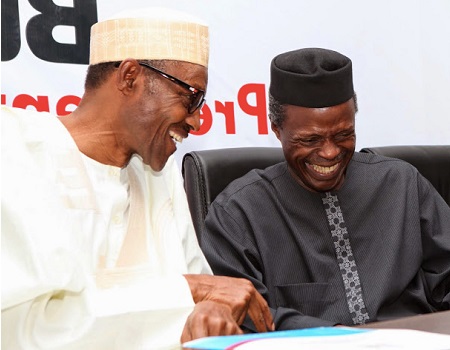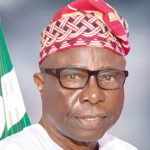Elections are critical moments in the life of any nation. In Nigeria, however, with the canons of democracy out of the equation, fear is the order of the day as the 2019 elections loom. Littered on walls and billboards are photo-shopped smirking faces of politicians, many of whom have left the electorate worse than they met them. These days, promises replete with banality are read from scripts politicians did not see till the last minutes of their campaigns.
Objective Nigerians, who are familiar with President Muhammadu Buhari’s 2015 campaign promises under the ‘Change’ mantra, know only little has been fulfilled in that regard. On May 29, 2015, the same day General Buhari resumed office as the president of Nigeria, the Vanguard published a complete list of his 2015 promises. The publication titled ‘What Buhari Promised Nigerians’, has a list of eleven major promises and eighty-one minor ones. Some highlights from Buhari’s 2015 campaign promises would suffice in this reflection.
Despite the exaggerated achievements accorded the agricultural sector by this government, food security and production are on the low side. Buhari had promised to “Guarantee a minimum price for all cash crops and facilitate storage of agricultural products…” How could agriculture flourish when local farmers and herdsmen in certain parts of the country are in constant clash? The prices of goods in the market are astronomically high and hunger is wreaking havoc in homes.
Public hospitals are almost in shambles. The general health of Nigerians is in jeopardy. Buhari had promised to “Increase the quality of all federal government-owned hospitals to world class standard by 2019.” This is 2019, and all Nigerians could see are dysfunctional federal government hospitals. If in 2017, the Aso Rock Clinic could not boast of a functional X-ray machine, what hope do common men have? Furthermore, the tourism industry is mediocre and the national heritages are eyesore. Yet, Buhari is one of the highest beneficiaries of medical tourism he promised to end in 2015.
Public infrastructures are deteriorating by the day. Before May 2015, the minister of power and housing pontificated that any serious government could fix Nigerian power problems within six month. Buhari, in this regards, promised to “Generate, transmit and distribute electricity on a 24/7 basis whilst simultaneously ensuring the development of sustainable/renewable energy, by 2019.” Currently, power supply is still a problem. Same is almost the cases with other public infrastructures that need urgent attention.
The economy and petroleum sectors are respectively wallowing in recession and subsidy scams. Buhari had promised to “Revive and reactivate our minimally performing refineries to optimum capacity.” Disappointingly, the refineries are virtually in comatose. The inability of the government to properly manage the abundant natural and human resources of the country is evident in the saddening statistics currently published by the National Bureau of Statistics that almost 21 million Nigerians are unemployed. Facts and figures have shown that more jobs were extinguished than created in this government.
On youth and education, a lot have gone wrong than good. The youth are no longer the future of the country, not when President Buhari regards them as lazy people. The education system has degenerated to something to parody. Nigeria has the highest number of out-of-school children in Africa and tertiary institution staff is always on strike. Buhari said he would be “Targeting up to 20% of our annual budget for this critical sector whilst making substantial investments in training quality teachers at all levels of the educational systems.” Conversely, in this year’s budget only a meagre 9% was allocated to education.
Security and governance have been bastardised in the last couple of years. Boko Haram insurgency, banditry and farmers herdsmen crisis are still here. Disobedience of court orders, disrespect for the rule of law, bullying of legislature, judiciary and opposition members, abuse of security apparatus have been recorded in this administration. Buhari had promised to “Restructure governance for a leaner, more efficient, and adequately compensated public service sector…” Nigerians are yet to experience this.
The list goes on. And, the elections are here again. President Buhari has moved from ‘Change’ to ‘Next Level’. In Buhari’s recent campaigns and rallies, especially that of Kano, he said he is seeking re-election because he wants to “correct the ills of the country” and that “we promised to fight corruption, insecurity and improve the nation’s economy. We have been able to achieve a lot in these three critical areas.” Nigerians should be better judges of that, for no desperate politician would assess himself without some level of bias.
For the record and clarity, one expects Buhari to succinctly explain to the electorate how he had accomplished at least seventy percent of his promises. Not knowing what one is saying or doing before, during and after elections, whether they win or not, is fatal. Buhari would always say he inherited an ill government. But, his seeking power and making campaign promises were about fixing an ill government. So, why come in and complain. Perhaps he had learnt that nobody fixes anything or goes to the next level of anything by complaining.
No doubt propaganda is part of political machination to woo voters, but the shift from ‘Change’ to ‘Next Level’ is rather obscure in the sense that the impact of ‘Change’ has not been generally felt. If that is the case, then what hope would ‘Next Level’ bring? Given Nigerian political, economic and security situation in the last four years, there is high level of possibility that ‘Change’ and ‘Next Level’ would crumble under thorough and objective scrutiny. This is because, out of the eleven major 2015 campaign promises with eighty-one other minor ones, Buhari could only boast of a meagre portion of the overwhelming list.
At this juncture, it would be germane to state that President Buhari has tried his best to serve the country the best way he knows how. He is a good, imperfect man who wishes Nigerians well. However, the circumstances surrounding him and his government have not allowed a great portion of his wishes to come to fruition. His health, age, cabal involvement in his government—which his wife, Aisha Buhari, has confirmed—to some degree, affected his administration and performance.
Kingsley Alumona is with the Nigerian Tribune
Bishop Matthew Hassan Kukah, in a recent lecture titled ‘Electoral Integrity, Legitimacy of Democratic Institutions and Good Governance’, stressed that no Nigeria leader was ever prepared to rule Nigeria. Also, Ambassador Dr Olatokunbo Awolowo Dosumu, in a recent lecture titled ‘Nigeria: Redefining Nationhood’, said, “Those who aspire to lead need to undergo a process of thorough self-preparation and critical self-examination first before presenting themselves to the citizenry as possible leaders.”
With the above assertions by Bishop Kukah and Dr Awolowo Dosumu, it is imperative to conclude this reflection by stressing that Nigerian citizenry and voting population should know that political parties and campaign promises are not enough to free them from misery. They should examine their past, present and future, and properly critique those seeking their votes before going to the polls.
Kingsley Alumona is with the Nigerian Tribune






